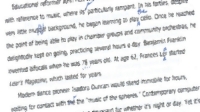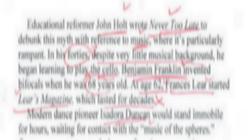| |
The Editor/Writer Revolving Door
by Marcia Yudkin
When the names of three magazine editors I'd written for in the early 1980's showed up on best-seller lists in 1996, I was excited. Jonathan Harr, author of the literary nonfiction book
A Civil Action, gave me at least half a dozen assignments when he served as the editor of The
Valley Advocate, an alternative weekly newspaper in Western Massachusetts, during my first few years freelancing.
Dan Goleman, author of
Emotional Intelligence, worked as an off-site editor for
Psychology Today back then, and helped me break into the magazine with a cover story on children's fears of the nuclear arms race. Thulani Davis, now known for her novel
Maker of Saints, was someone I pursued - and finally snagged
- with query after query when she worked for The Village Voice in New York City.
|
When I reflect now on how these people made a spectacular transition from editor to writer, I find numerous lessons for writers beyond the obvious prediction that if you freelance long enough, one day you too will be able to say, "I knew so-and-so when." Even if you never take on the formal job title "editor" yourself, it's important for you to understand the frequency with which word-oriented people shape-shift from writer to editor, vice versa or back and forth.
First, do consider that if you are building toward a career as a full-time writer, a job as an editor can offer valuable stability while you establish yourself. The regular paycheck and fringe benefits that accompany most staff editor positions provide a salient advantage over scrambling for assignments and worrying about magazines' cash flow policies.
|
|
Published! How to
Reach Writing Success
|
|
Besides, according to several editors-turned-writers that I spoke with, the job can include numerous intangible benefits for writers-to-be. John Rizza of Boxford, Massachusetts, credits his on-the-job training at
Self-Employed Professional magazine with his becoming a writer at all.
With a background in banking, Rizza joined the magazine during its start-up phase as its controller. "They liked my memos, and made me the finance editor," he says. "Since there was such a small staff, we handed stuff back and forth to each other to read, and that's how I improved as an editor and writer."
One year later, having gotten a taste of wordsmithing, he left the magazine to freelance successfully for
Nation's Business, Home Business Journal, Entrepreneurial Edge and other business magazines.
 |
Improve Your
Proofreading
Quick online course teaches how to
catch pesky typos. Whether you check
writing on screen or on paper, learn the
stakes for error-ridden copy, the five
best proofreading methods and the tools
you can or shouldn't use to identify
errors. Includes practice tests and
answers.
Proofreading Hacks course. |
Like Rizza, Mal Gormley found an editorial position perfect training for a transition into full-time freelancing. A former pilot, Gormley was hired by
Commercial Aviation magazine as a copy editor after a string of copy editors with good English skills but little knowledge of aviation let embarrassing errors remain in the magazine.
Once at the magazine, he mentioned that he knew a little about computers and promptly found himself responsible for writing and editing material on aviation computing. He now specializes in freelancing on avionics and says that he's living his dream life on the coast of Maine.
Even in the lowest of editorial positions at a large organization, you have an advantage over outsiders when submitting your writing for consideration. As a proofreader at her local daily newspaper, K.D. Schutte of Hamilton, Ohio, was no faceless name when she gathered up the nerve to lay two book reviews she'd written on an editor's desk.
She built up her confidence and her collection of clips by submitting more book reviews, then articles. Her momentum at the paper propelled her to success freelancing for national and regional, as well as local, publications.
If you took a different path toward full-time freelancing, you should still take note of the common transition from editor to writer, because it means that editors you're dealing with may have just as much writing skill and as many freelance credentials as you.
If you ever need an additional reason to respect the editors you work with, here's one: they may be will-be rather than would-be or never-wanted-to-be writers. This also means you should never whine that editors don't know what it's like to freelance -- many do.
|
Develop a Dependable Income
as a Marketing Consultant
If you have good writing skills, you can learn how
to make $100/hour or even more helping businesses
and individuals improve their marketing materials.
This ten-week tutorial program works! Become
a freelance commercial writer/marketing
consultant. |
Moreover, because of their vantage point on the inside, editors-turned writers may have a better understanding of the decision-making process and needs of magazines than writers who have only freelanced. "I know what good and bad writing looks like, so I know what to send (or not to send) an editor," says Anne Winthrop, a former managing editor of American Baby magazine who is trying to ease into freelancing.
"I know where to find sources, and I know how to determine the quality of a source. Also, since I'm mainly sticking to the somewhat specialized field of the magazine I was editing, I know the readership well and therefore am at no loss for story ideas."
John Rizza adds that as a magazine editor, he found it easy to meet and develop relationships with other magazine editors who now regularly call him with writing opportunities. "At
Folio magazine conferences I'd meet other editors who were targeting small business and finance issues, and then keep in touch with them a few times a year. I even called editors at competing magazines to discuss general topics we shared an interest in. Initially they were surprised to hear from me, but then we built a relationship and now I'm writing for some of them. I think it would have been harder to meet editors as a writer."
However, in my experience, the editor/writer revolving door means that when you get to know other writers, you're also often enough getting to know editors. Recently Susan Pollack, someone I've known for more than ten years through the Boston chapter of the National Writers Union, called me and mentioned in the course of conversation that she was now a senior editor at
New Age Journal. I caught her up on my latest projects, one of which evoked her editorial interest and developed into an article assignment just a few weeks later.
Similarly, before I'd ever published anything I joined a fiction writing group and developed a friendship with classmate Edie Clark, who was then writing articles regularly for
Yankee magazine. Later, when she joined the staff of the magazine and I was beginning to publish articles, she helped me get my first assignment from
Yankee.
By networking with other writers, in professional organizations, classes or at writers' conferences, you are thus also meeting a good number of current and future editors. Since in the writing context they're putting themselves forward as writers, though, you may need to schmooze especially well to uncover their status as an editor.
Although both roles involve words and ideas as raw material, not every good writer makes a good editor, and vice versa. "As a writer you're telling a story," observes Curt Franklin, senior editor of
Solutions Integrator Magazine.
"The hardest part in the development of a writer is finding your voice, the special way that you have with ideas and words, and then learning to trust that voice to tell the story. As an editor, your primary focus is on coming up with stories to be told. You then find people to tell them and
- this is the hard part - let them tell those stories in their own voices.
"Writing satisfies your ego in ways that editing doesn't," Franklin continues. "Good editors tend to be good teachers, helping the writer become better with each story, and not worrying so much about not seeing their own names in the byline."
If the stability of a staff editing job and writing after hours sounds like an appealing combination that fits your disposition, consider too whether you have the stamina to deal with words for just about all your waking hours.
Toni Morrison wrote several of her Nobel Prize-winning novels while working as an editor for Random House, so she clearly managed that challenge well. However, the late novelist John Gardner thought such mental fortitude unusual enough that he advised beginning writers who needed a day job to pursue something wordless, such as carpentry or gardening.
In contemplating your ideal balance between freelance writing and staff editing, think too about whether you have the resourcefulness, appetite for risk and marketing energy necessary to make a living as a writer. If not, an editing job, perhaps part-time, can be a great fallback.
|
Get to the Point Quickly. Enuff Said?
Eliminate wordiness. Learn how to get your point across in one page or how to satisfy a strict word count for magazine or newsletter editors. Discover how to identify and cut repetition, slash excess verbiage, make your point fast and convey a wealth of facts in a small space. My longwinded clients asked for this!
Become more
concise and pithy. |
Lucy McCauley, a writer based in Cambridge, Massachusetts, told me that the limited market for the literary travel pieces she most enjoyed writing made her contract position as copy chief for the magazine
Fast Company attractive. The post provided enough flexibility and time off to travel and write about her travels, and enough income to ease financial pressures.
Since I'm fanatical about needing freedom in my life, an editorial position has never appealed to me as an option. But I still see a way to take advantage of the writer/editor revolving door I referred to in my opening paragraph. I've placed my former editors Jonathan Harr, Dan Goleman and Thulani Davis on the list of potential blurb writers for one of my upcoming books.
Copyright 1997 Marcia Yudkin. All rights reserved.
|







